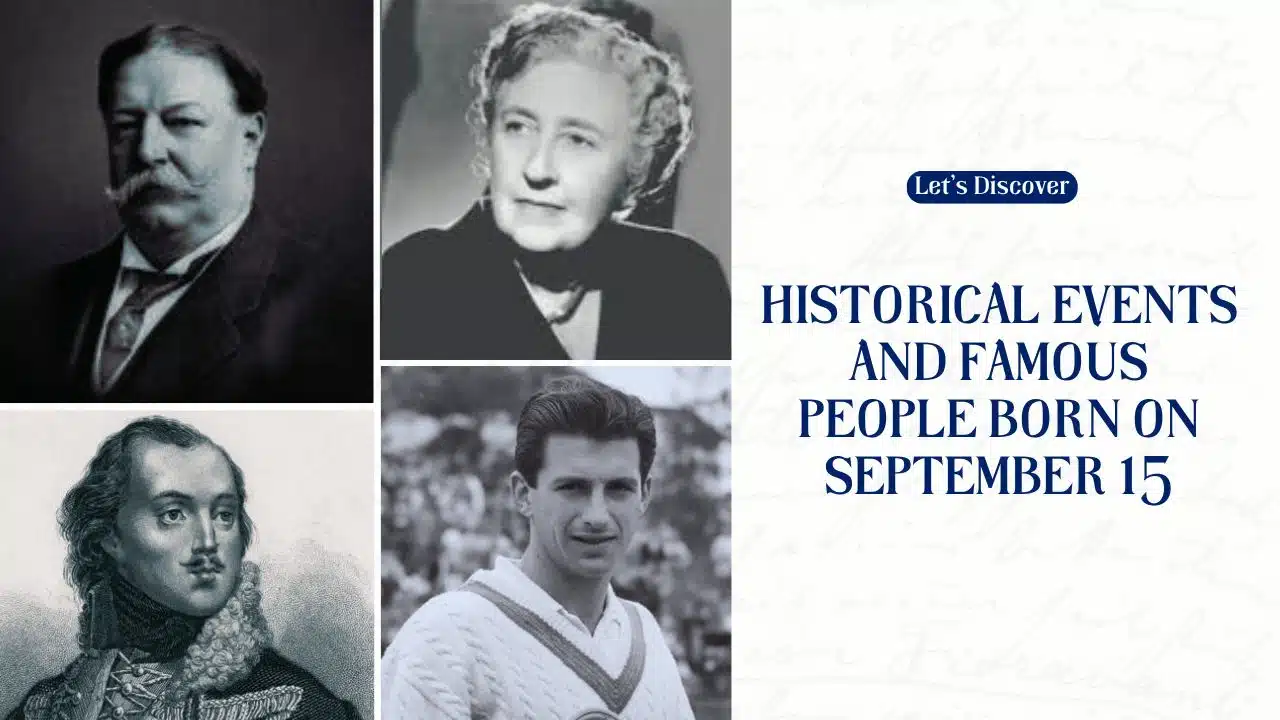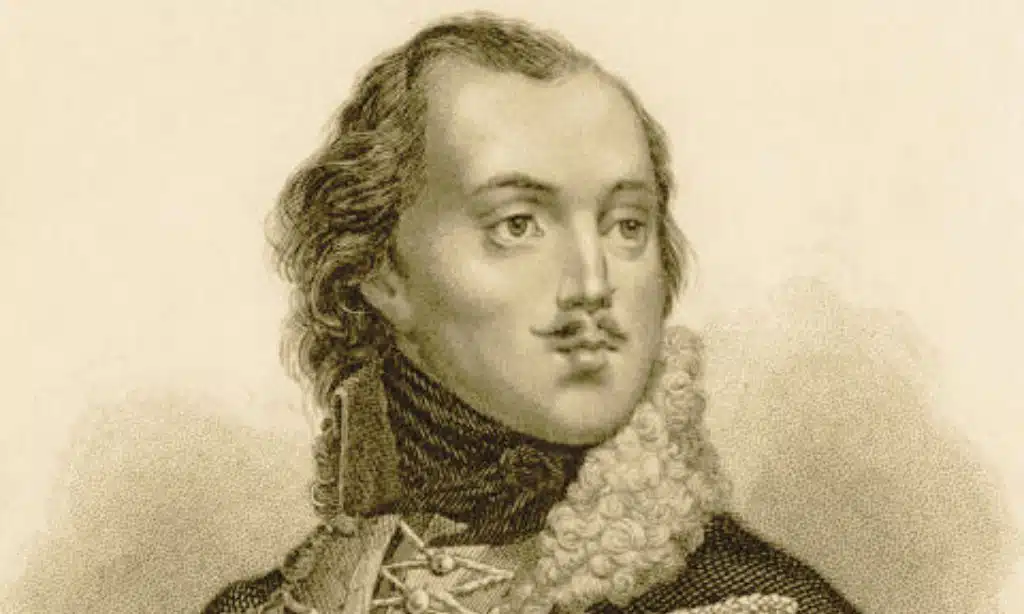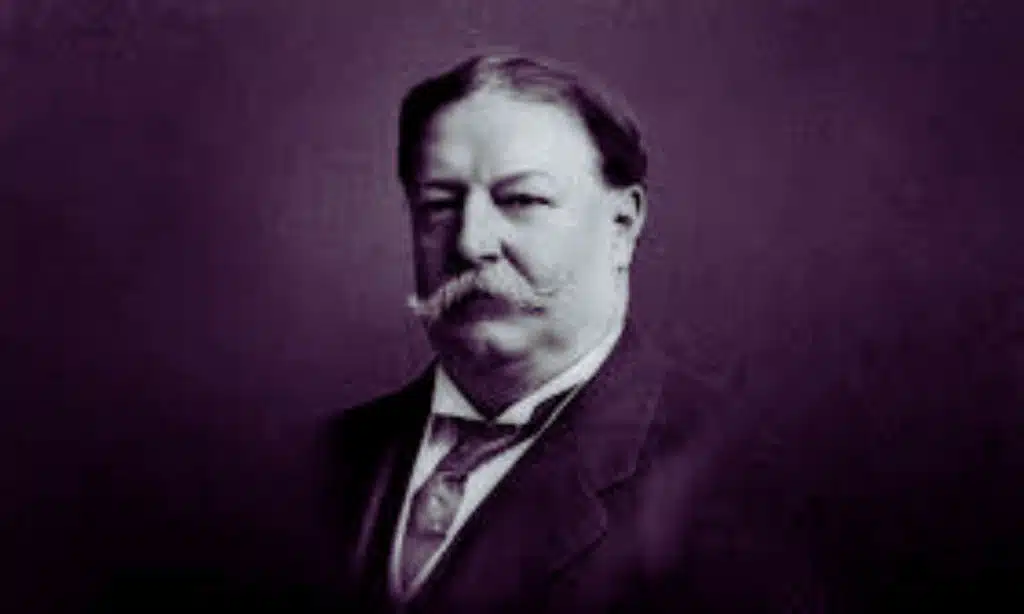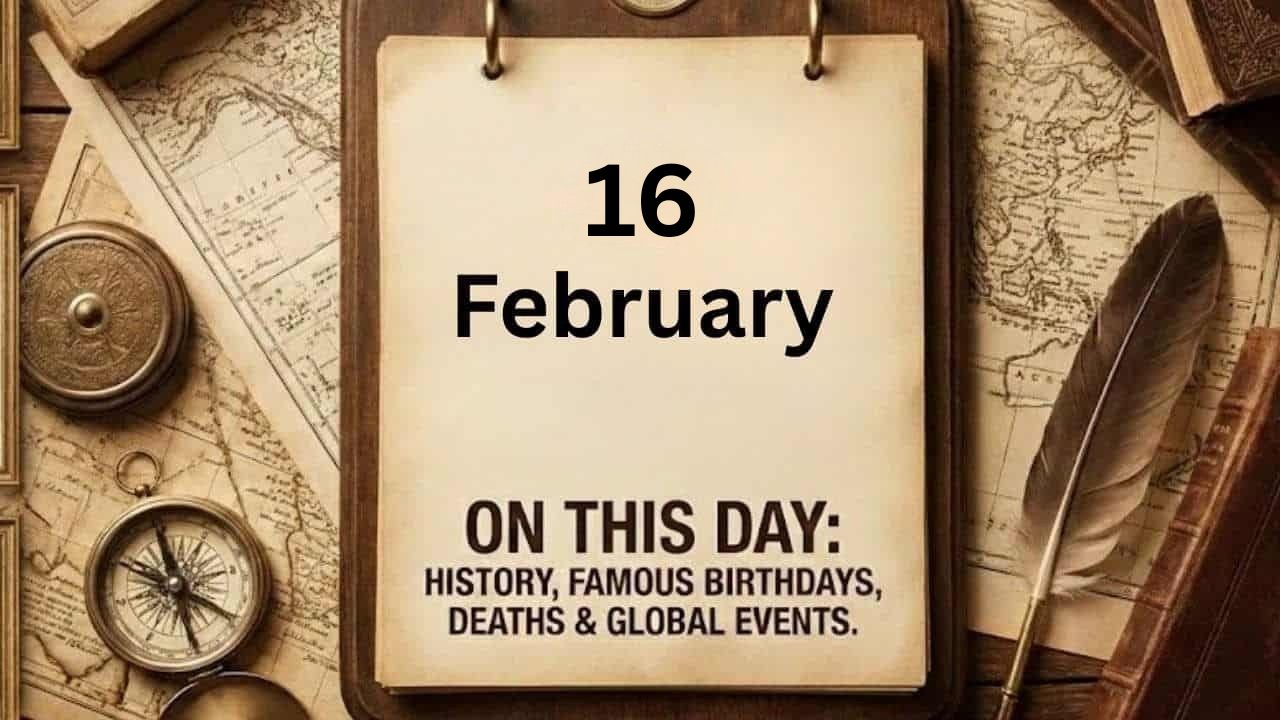September 15 is a day full of important events in history. It’s also the birthday of many famous people who changed the world in different ways.
In this article, we’ll learn about five big events that happened on this day and five important people born on September 15. These events and people come from different times and places, showing how one day can be important for many reasons.
Historical Events of September 15
1. Retirement of Charles V (1556)
On September 15, 1556, Charles V, a very powerful ruler, decided to stop being in charge and retire. He went to live in a special religious place called the Monastery of Yuste in Spain.
Charles V was a big deal in Europe. He was the king of Spain and also the leader of the Holy Roman Empire. This meant he ruled over many countries. He was in charge for about 40 years, which is a very long time.
Why did he retire? Charles V was tired after fighting many wars and dealing with lots of problems in his big empire. He also had health issues that made it hard for him to rule anymore.
Retiring to a monastery was unusual for a king. It showed that Charles V wanted to live a quiet life and think about God. This decision surprised many people and changed how things were run in Europe.
2. Appointment of Casimir Pulaski (1777)
On September 15, 1777, George Washington, the leader of the American army during the Revolutionary War, gave an important job to a man named Casimir Pulaski. Washington made Pulaski a brigadier general in the army’s cavalry, which means he was in charge of soldiers on horses.
Casimir Pulaski was from Poland, not America. He came to America to help fight for freedom. Before this, he had fought for freedom in his own country.
Pulaski was very good at fighting on horseback. He taught the American soldiers how to fight better on horses. This was very helpful in the war against the British.
By giving Pulaski this job, Washington showed that he trusted people from other countries to help America. Pulaski’s work was so important that he is now called the “Father of American Cavalry.”
3. First Use of Tanks in Warfare (1916)
On September 15, 1916, something new and scary appeared on the battlefield. It was the first time tanks were used in a war. This happened during World War I, in a battle called the Battle of Flers-Courcelette, which was part of a bigger fight called the Battle of the Somme.
The tanks were called Mark I “Little Willies.” They were made by the British. These tanks looked very different from the tanks we know today. They were slow, broke down a lot, and were not very comfortable for the soldiers inside. But they were still very scary for enemy soldiers who had never seen anything like them before.
The tanks could crush barbed wire and cross trenches, which were big problems for soldiers on foot. This changed how wars were fought. Even though these first tanks had many problems, they showed that tanks would be very important in future wars.
4. Battle of Britain Day (1940)
September 15, 1940, was a very important day in World War II. It’s now called the Battle of Britain Day. On this day, the British Royal Air Force (RAF) fought hard against a big attack by the German air force, called the Luftwaffe.
The Battle of Britain was a series of air fights between Britain and Germany. Germany was trying to take over Britain by first destroying its air force. But on this day, the British pilots fought back very well.
The British lost 29 planes, but the Germans lost even more – between 57 and 61 planes. This showed that the British could defend themselves against the German attacks. It was a turning point in the battle, and after this, Germany started to give up on its plan to invade Britain.
The British Prime Minister, Winston Churchill, famously said about the RAF pilots: “Never in the field of human conflict was so much owed by so many to so few.” This meant that all of Britain was thankful for the brave pilots who defended the country.
5. The Great Pop Prom (1963)
On September 15, 1963, a big music event happened in London, England. It was called The Great Pop Prom and it took place at a famous concert hall called the Royal Albert Hall.
The most exciting thing about this concert was that The Beatles were the main performers. The Beatles were becoming very famous at this time, and everyone wanted to see them play.
But The Beatles weren’t the only important band there. Another famous group, The Rolling Stones, played too. They were one of the opening acts, which means they played before The Beatles.
This concert was important because it showed how popular rock and pop music was becoming. Having two of the biggest bands in music history play at the same event was very special. It helped show that this new kind of music was here to stay.
Famous Birthdays on September 15
1. James Fenimore Cooper (1789-1851)
James Fenimore Cooper was born on September 15, 1789, in Burlington, New Jersey. He became one of the first important American writers.
Cooper is most famous for writing “The Last of the Mohicans.” This book and others he wrote told exciting stories about life in early America, especially about adventures with Native Americans.
Cooper’s books were some of the first to really show what made America different from other countries. He helped create a truly American kind of literature.
Here’s a quick look at James Fenimore Cooper’s life:
| Fact | Information |
|---|---|
| Born | September 15, 1789 |
| Birthplace | Burlington, New Jersey, USA |
| Died | September 14, 1851 |
| Famous for | Writing “The Last of the Mohicans” |
| Type of writing | Novels about early American life |
| Other famous works | “The Pioneers,” “The Prairie” |
| Impact | Helped create American literature |
2. William Howard Taft (1857-1930)
William Howard Taft was born on September 15, 1857, in Cincinnati, Ohio. He had a very special career because he was both the President of the United States and later became a judge on the highest court in America.
Taft was the 27th President, serving from 1909 to 1913. After being President, he became the Chief Justice of the Supreme Court. He is the only person in U.S. history to have both these important jobs.
As President, Taft worked on many things, including breaking up big companies that had too much power. As Chief Justice, he made important decisions about the law that are still remembered today.
Here’s a quick look at William Howard Taft’s life:
| Fact | Information |
|---|---|
| Born | September 15, 1857 |
| Birthplace | Cincinnati, Ohio, USA |
| Died | March 8, 1930 |
| Famous for | Being both U.S. President and Chief Justice |
| Political Party | Republican |
| Years as President | 1909-1913 |
| Years as Chief Justice | 1921-1930 |
| Other important job | Governor-General of the Philippines |
3. Sarat Chandra Chattopadhyay (1876–1938)
Born on September 15, 1876, in Debanandapur, Bengal, Sarat Chandra Chattopadhyay became one of the most beloved writers in Bengali literature.
His novels—such as “Devdas,” “Parineeta,” “Pather Dabi,” and “Srikanta”—explored human emotions, social injustice, and the struggles of women in early 20th-century India.
Sarat Chandra’s simple yet powerful storytelling made his works timeless, inspiring countless film adaptations and translations across India and beyond.
| Fact | Information |
|---|---|
| Born | September 15, 1876 |
| Birthplace | Debanandapur, Hooghly, Bengal (now West Bengal, India) |
| Died | January 16, 1938 |
| Famous for | Writing classic Bengali novels |
| Notable works | “Devdas,” “Parineeta,” “Pather Dabi,” “Srikanta” |
| Literary style | Simple, realistic storytelling about society and human struggles |
| Legacy | Inspired numerous films and translations across India |
4. Agatha Christie (1890-1976)
Agatha Christie was born on September 15, 1890, in Torquay, England. She became one of the most famous mystery writers in the world.
Christie wrote many books that kept readers guessing until the very end. Her most famous characters were Hercule Poirot, a detective with a funny mustache, and Miss Marple, an old lady who solved crimes.
Some of Christie’s most famous books are “Murder on the Orient Express” and “And Then There Were None.” She also wrote the world’s longest-running play, “The Mousetrap.”
Here’s a quick look at Agatha Christie’s life:
| Fact | Information |
|---|---|
| Born | September 15, 1890 |
| Birthplace | Torquay, Devon, England |
| Died | January 12, 1976 |
| Famous for | Writing mystery novels |
| Best-known characters | Hercule Poirot, Miss Marple |
| Famous books | “Murder on the Orient Express,” “And Then There Were None” |
| Famous play | “The Mousetrap” |
| Nickname | “Queen of Crime” |
5. Jean Batten (1909-1982)
Jean Batten was born on September 15, 1909, in Rotorua, New Zealand. She became famous for flying airplanes at a time when not many women did this.
Batten’s biggest achievement was making the first solo flight from England to New Zealand in 1936. This was a very long and dangerous journey, and it took her 11 days and 45 minutes to complete it.
Jean Batten set many records for flying long distances. She was very brave and helped show that women could be great pilots too.
Here’s a quick look at Jean Batten’s life:
| Fact | Information |
|---|---|
| Born | September 15, 1909 |
| Birthplace | Rotorua, New Zealand |
| Died | November 22, 1982 |
| Famous for | First solo flight from England to New Zealand |
| Year of famous flight | 1936 |
| Other achievements | Set many long-distance flying records |
| Nickname | “Garbo of the Skies” |
| Awards | Commander of the Order of the British Empire (CBE) |
6. Ashley Cooper (1936-2020)
Ashley Cooper was born on September 15, 1936, in Melbourne, Australia. He was a very good tennis player who won many important tournaments.
Cooper’s best years were 1957 and 1958. In these years, he won the Australian Championships (now called the Australian Open) twice. He also won Wimbledon and the U.S. Championships (now called the U.S. Open) in 1958.
Ashley Cooper helped make Australia famous for having great tennis players. He was part of a group of Australian players who were very hard to beat in the 1950s and 1960s.
Here’s a quick look at Ashley Cooper’s life:
| Fact | Information |
|---|---|
| Born | September 15, 1936 |
| Birthplace | Melbourne, Victoria, Australia |
| Died | May 22, 2020 |
| Famous for | Winning major tennis tournaments |
| Grand Slam singles titles | 4 (Australian 1957, 1958; Wimbledon 1958; US 1958) |
| Highest world ranking | World No. 1 (1957 and 1958) |
| Davis Cup | Helped Australia win in 1957 |
| Hall of Fame | Inducted into International Tennis Hall of Fame in 1991 |
Takeaways
September 15 is a day that has seen many important events in history. From kings retiring to new weapons being used in war, and from music concerts to brave pilots making long flights, this day has a bit of everything.
It’s also the birthday of people who changed the world in different ways. We have a writer who helped create American literature, a man who was both President and Chief Justice, a woman who wrote mystery stories that are still popular today, a brave woman pilot, and a tennis champion.
All these events and people show us how one single day can be important for many different reasons. It reminds us that history is made every day, by people doing both big and small things that end up changing the world.
References:
- “The Eighty Years’ War.” Encyclopedia Britannica.
- “Napoleon’s Invasion of Russia.” History.com.
- “Karl Marx and Das Kapital.” Stanford Encyclopedia of Philosophy.
- “Theodore Roosevelt.” The White House Historical Association.
- “The Neutrality Acts, 1930s.” U.S. Department of State, Office of the Historian.
- Alexander von Humboldt.” National Geographic.
- “Margaret Sanger.” National Women’s History Museum.
- “Jacobo Árbenz.” Encyclopedia Britannica.
- “Sam Neill.” IMDb.
- “Dmitry Medvedev.” Russia.gov, Official Website of the Russian Government.





































